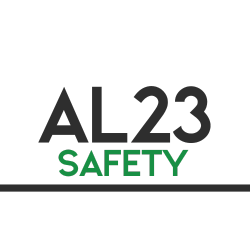First aid training in the workplace is no longer optional. It’s a critical lifeline that can mean the difference between life and death. In today’s fast-paced work environments, emergencies strike without warning, from minor cuts to sudden cardiac arrests. Yet, a shocking study by St John Ambulance reveals that nearly one-third of UK employees have faced situations where no trained first aider was available. Even more alarming, 22% have never undergone any workplace first aid training at all. These statistics expose a dangerous skills gap that businesses must urgently address to ensure employee safety and legal compliance.
This guide from AL23 Safety explores the vital role of first aid training in the workplace, backed by real data and practical solutions. Whether you run a small office or a large factory, equipping your team with these skills fosters a culture of care and readiness.
The Urgent Need for First Aid Training in the Workplace
First aid training in the workplace goes beyond ticking boxes on a health and safety checklist. It empowers employees to act decisively in crises, potentially saving lives and reducing injury severity. The St John Ambulance report paints a stark picture: despite 79% of workers expressing genuine concern for colleagues’ wellbeing, preparation lags far behind intent. Imagine a colleague collapsing from a heart attack. Would your team know how to perform CPR or use a defibrillator?
This disconnect arises from outdated priorities. Employees often spend hours on mundane tasks like brewing tea for the office, yet devote minimal time to life-saving first aid courses UK-wide. Redirecting just a fraction of that effort into accredited workplace first aid training could transform your organisation. At AL23 Safety, we’ve seen businesses thrive by making emergency preparedness in the workplace a core value.
Understanding UK Legislative Requirements for Workplace First Aid
Under the Health and Safety (First-Aid) Regulations 1981, every UK employer is legally obliged to provide adequate first aid provisions. This includes assessing workplace risks, such as hazardous machinery in factories or slip hazards in offices, and ensuring sufficient trained personnel, equipment, and facilities are in place.
Failure to comply can result in hefty fines, lawsuits, or worse: preventable tragedies. First aid training in the workplace isn’t just about having a kit in the cupboard. It requires regular needs assessments tailored to your setting. For high-risk industries like construction or manufacturing, multiple trained first aiders per shift are non-negotiable. AL23 training programmes align perfectly with these rules, offering certified courses that keep you compliant and confident.
Common Challenges Hindering Effective First Aid Training in the Workplace
Despite good intentions, several barriers persist. Skill fade is a major issue: 22% of employees haven’t refreshed their knowledge in over five years, rendering their training ineffective. Memory decays rapidly without practice, meaning even well-intentioned staff may freeze in real emergencies.
Workplace culture plays a sneaky role too. Time wasted on low-value activities overshadows opportunities for growth. Why prioritise endless meetings when a short session on first aid courses UK could equip your team for the worst? Additionally, smaller businesses often underestimate risks, assuming “it won’t happen here.” But accidents don’t discriminate. Office workers face ergonomic injuries, while remote sites deal with isolation delays in ambulance arrival.
Overcoming these challenges starts with leadership. Schedule regular refreshers, integrate AL23 training into onboarding, and promote a “safety first” mindset. This not only boosts morale but enhances overall emergency preparedness in the workplace.
Proven Strategies to Boost First Aid Training in the Workplace
Bridging the gap requires action. St John Ambulance advises training multiple staff members per department, with refreshers every three years at minimum. Embed workplace first aid training into your culture through:
- Annual Risk Assessments: Identify unique hazards and adjust provisions accordingly.
- Blended Learning Options: Combine online modules with hands-on practice for flexibility.
- Incentives for Participation: Reward completers to encourage uptake.
- Mental Health First Aid Integration: Address the growing need for psychological support alongside physical.
At AL23 Safety, our tailored first aid courses UK deliver practical, scenario-based learning. From basic wound care to advanced life support, we cover it all. Businesses adopting these steps report fewer incidents and higher employee retention. Proof that investing in first aid training in the workplace pays dividends.
Real-Life Impacts: How Workplace First Aid Training Saves the Day
Consider a warehouse worker who suffers a severe allergic reaction. A trained colleague administers an EpiPen promptly, stabilising them until paramedics arrive. Or an office setting where CPR revives a victim of sudden illness. These aren’t hypotheticals. They’re outcomes of robust emergency preparedness in the workplace.
Data backs this: trained responders can reduce fatality risks by up to 50% in cardiac events. Moreover, proactive training minimises downtime, insurance claims, and reputational damage. In an era of hybrid work, virtual-first options via AL23 training ensure even remote teams stay prepared.
The Business Case for First Aid Training in the Workplace
Beyond compliance and safety, workplace first aid training delivers measurable ROI. Companies with comprehensive programmes see:
- Reduced Absenteeism: Quick interventions mean faster recovery times.
- Lower Insurance Premiums: Proven safety records attract better rates.
- Enhanced Team Morale: Employees feel valued when safety is prioritised.
- Reputation Boost: Safety-conscious brands attract top talent.
A single prevented incident can save thousands in medical costs and lost productivity. Forward-thinking leaders recognise first aid training in the workplace as a strategic advantage, not an expense.
Conclusion: Make First Aid Training in the Workplace Your Priority Today
First aid training in the workplace is an investment in people, not paperwork. By addressing skills gaps, meeting legal standards, and fostering a proactive culture, you create a resilient organisation ready for anything. Don’t wait for an incident to highlight deficiencies. Act now.
For expert guidance and bespoke first aid courses UK, contact AL23 Safety. Our programmes bridge the gap effectively. Visit our services page to get started and safeguard your team’s future.



